Resources
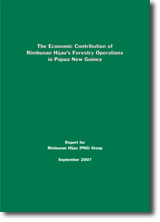
The Economic Contribution of Rimbunan Hijau’s Forestry Operations in Papua New Guinea
The commercial harvesting and processing of PNG’s rich forest resources generates significant social and economic benefits for its people. This report highlights the significant complementarities between what a committed forestry company such as Rimbunan Hijau can provide local communities in terms of economic activity, employment, infrastructure and social services, on the one hand, and what those communities can reasonably expect from National and Provincial Governments, on the other.
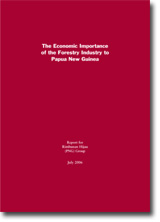
The Economic Importance of the Forestry Industry to Papua New Guinea.
Forestry’s contribution to the economy of Papua New Guinea (PNG) is significant. However, in the last two years Greenpeace has spearheaded a campaign against commercial forestry in PNG. They claim the industry devastates the environment, is illegal and practices human rights abuse. Most of the assertions are exaggerated or baseless. This report examines the economic contribution of the forest industry to PNG. The report includes a case study of one region, which shows the extent and value of infrastructure and social services provided the forestry industry.
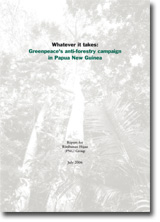
Whatever it takes – Greenpeace’s anti-forestry campaign in Papua New Guinea .
Forestry’s contribution to the economy of Papua New Guinea Since 2004, Greenpeace has spearheaded an aggressive campaign to stop commercial forestry in Papua New Guinea (PNG). It has conducted the campaign by proxy and focused its attack on Rimbunan Hijau (PNG) Group, the major player in Papua New Guinea’s forestry industry. Greenpeace has only two interests in PNG: first, to see it used as a model for its own view of how the world should look; and second, to secure a tactical victory to support its global campaign to stop commercial forestry.
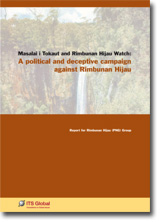
Whatever it takes – Greenpeace’s anti-forestry campaign in Papua New Guinea .
Two anonymous websites have mounted a slander campaign against the forestry industry and, specifically, Rimbunan Hijau (PNG) Group, the largest forestry business in Papua New Guinea (PNG). Masalai i Tokaut is a web-based newsletter which circulates allegations of corruption and mismanagement in the forestry industry. Rimbunan Hijau Watch is a website whose sole purpose seems to be to undermine the credibility of Rimbunan Hijau. ITS Global was commissioned by Rimbunan Hijau to undertake an independent critique of these websites.
Background Papers (PDF)
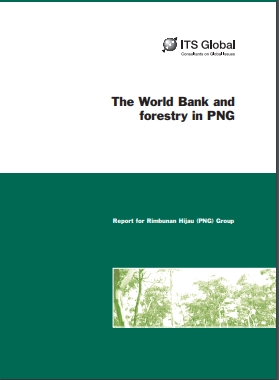
The World Bank and Forestry in PNG .
The sustainable potential of Papua New Guinea’s forestry endowment is not being maximized. The reasons need to be understood if they are to be addressed. This note provides background on the World Bank’s recent forestry relationship with Papua New Guinea (PNG).
Rimbunan Hijau – About the company
Rimbunan Hijau was established as a timber contractor in Malaysia by Tiong Hiew King in 1975. Over the past 30 years, Rimbunan Hijau has become a multinational company spanning six continents.
A. Brief History
Rimbunan Hijau was established as a timber contractor in Malaysia by Tiong Hiew King
in 1975. Over the past 30 years, Rimbunan Hijau has become a multinational company
spanning six continents, with business interests in Japan, Hong Kong, Australia, Canada,
the United States, New Zealand, Singapore, China, Russia, Papua New Guinea (PNG),
Equatorial Guinea, Brazil and British Guyana. Rimbunan Hijau has expanded beyond
timber exports and processing to cover reforestation, finance, media, IT, mining,
aquaculture, agriculture (oil palm plantation), and property development.
In Malaysia, Rimbunan Hijau has become one of the largest manufacturers and exporters
of plywood. There are three publicly listed companies under the Group: Subur Tiasa,
Jaya Tiasa and Sin Chew Media Corporation. Rimbunan Hijau’s Ming Pao Group has
successfully listed in Hong Kong.
B. Papua New Guinea
Rimbunan Hijau commenced operations in PNG in 1989, initially as a logging and
marketing contractor in the timber resources industry. Presently, it is the permit holder
or logging contractor for 17 forestry concessions. Its business operations in PNG include
timber extraction, timber processing, media publications, general trading, shipping, travel,
and property development. In less than a decade, Rimbunan Hijau has transformed from
a small timber and logging business venture into a multinational conglomerate with a
wide range of business investments.
Downstream processing
The downstream processing operations of commercial timber resources have been
Rimbunan Hijau’s most important establishments in Papua New Guinea. The Panakawa
Veneer Mill began operations in 1997 at a strategically-centred site in Western Province.
It is a state-of-the-art downstream processing facility which illustrates Rimbunan Hijau’s
commitment to sustainable forest management. The establishment of the mill has led to
increased production of value-added timber products, and technology transfers. It
provides direct employment and training to over 3,000 PNG citizens, whilst further
1,000 are employed on a contract basis.
Rimbunan Hijau has also established five downstream processing operations. Sawmills
are located in Teredau (Gulf Province), Kamusie (Western Province), Edevu (Central
Province) and Sagarai-Gadaisu (Milne Bay Province). These downstream processing
plants are export-orientated and represent significant investments; the sawmill at Teredau
alone represents a 20 million Kina (K) outlay.
Rimbunan Hijau sells veneer mainly to South Korea; round logs to China, Japan, South
Korea, Taiwan; and sawn timber to Australia, New Zealand, China, Japan, and Taiwan.
Infrastructure and Social Benefits
Rimbunan Hijau has spent over 16 million Kina on infrastructure in PNG since 1996.
This includes ten all-weather airstrips, numerous main and artery all-weather roads, and
more than 70 health centres, schools and churches in its areas of operation. In addition,
Rimbunan Hijau has engaged doctors to provide medical services to people and training
to local health workers, as well as free medical supplies. The absence of Government
provision of social services and basic infrastructure in rural and remote locations
increases the importance of the services and infrastructure provided by Rimbunan Hijau.
In June 2003, Rimbunan Hijau set up the Vailala Development Trust, with the aim to
promote and foster integrated architecture, infrastructure and community development
in the Vailala Block 2 & 3 Timber Permit Area. In January 2005, Rimbunan Hijau
facilitated a second Development Trust at the Vailala Block 1 Timber Permit area, which
has already distributed K320,000 for the first phase of the Kerema to Ihu road construction
project.
At Teredau and Panakawa, women are employed at the end of the processing stage, and
wages exceed the level required by provincial legislation. Rimbunan Hijau pays for
employees’ relocation costs, provides free meals and supplies the provincial government
with timber for housing. At Kamusi, a school has been established which caters for over
200 children of plant workers. Shops have been built (including some owned by locals),
as well as an airstrip, medical aid posts, and police facilities. Workers have free
accommodation and free electricity.
Financial Contributions
From 1993 – 2005, Rimbunan Hijau has contributed K1.08 billion (approx AU$507.5
million) to Papua New Guinea. This contribution has come in terms of wages (K138
million), salary tax (K56 million), premiums and levies (K146 million), royalty payments
(K11 million), export duty (K568 million), income and corporate tax payments (K30
million), infrastructure (K25 million), and miscellaneous payments (K2.7 million).
Rimbunan Hijau has also contributed goods and finance to the Port Moresby general
hospital, the PNG Diabetes Association and the PNG Red Cross, amongst other
ventures.